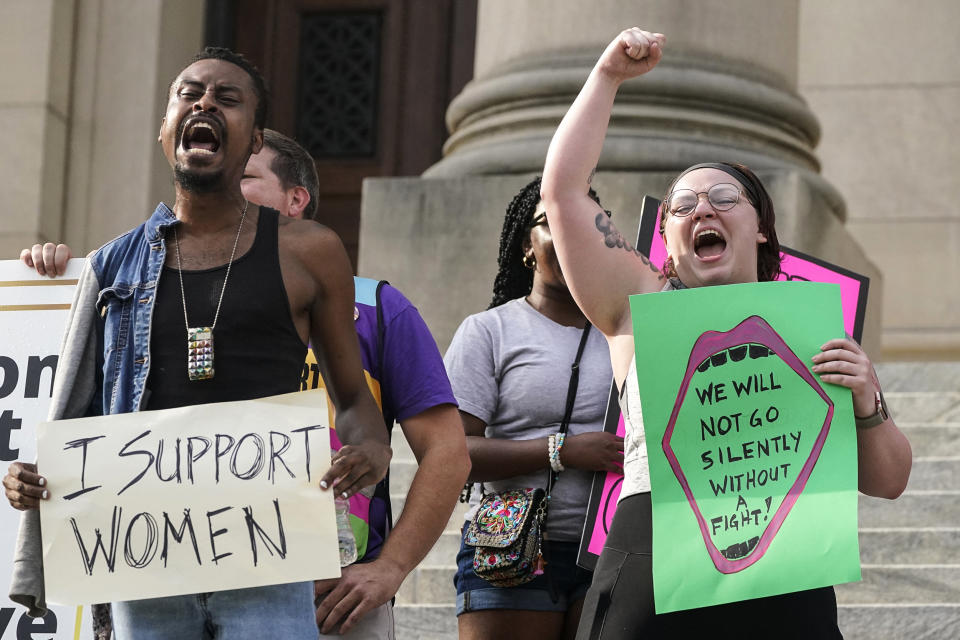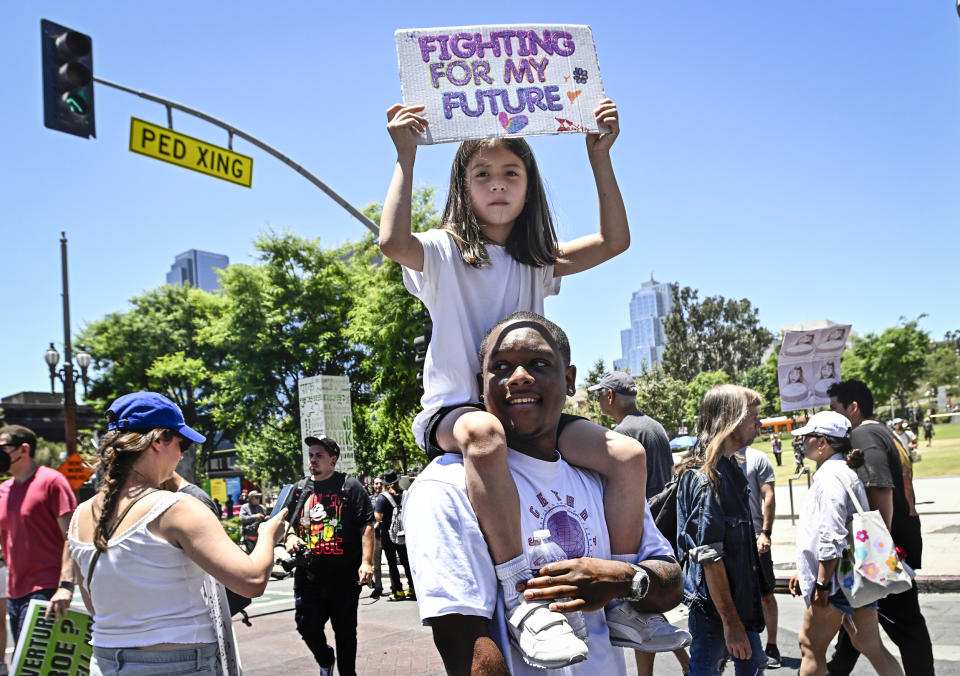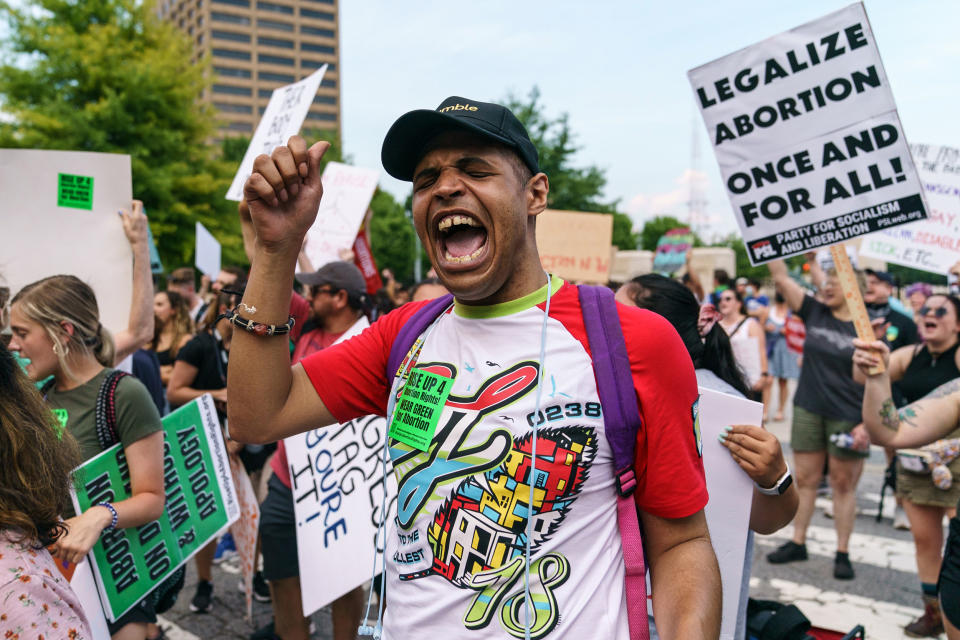Black women will face the worst of Roe’s reversal. Men in their lives anticipate trauma.
For sociologist Rodney Coates, the news of the reversal of Roe v. Wade triggered painful personal trauma. In the 1940s, his aunt, a teenager at the time, was forced to travel from their home in East St. Louis, Illinois, to have an abortion in Chicago, “the closest place where she could find a doctor that would treat a Black woman,” he said.
The procedure was legal, but “it was botched,” said Coates, a professor of critical race and ethnic studies at Miami University in Ohio. “And she died 400 miles away from her family. This decision by the Supreme Court will create a lot more tragic cases like my aunt’s.”
Black men who spoke with NBC News say they oppose the high court’s decision because it could force many Black women to resort to desperate measures to terminate unwanted pregnancies, putting their health — and families — in peril. They said they also fear it will increase the vast medical disparities Black women already face.

Meanwhile, Barry Holland, a communications executive who is Black and lives in New York, cheered the overturning of Roe v. Wade, saying Black people’s demographics have been stunted since the 1960s because of too many abortions.
Coates, for one, disagrees with Holland. “The reversal is going to cause a lot of trauma within the Black family, within the Black community,” he said. “And, and for Black males, it’s one of those traumas that comes down to feeling helpless and hopeless, where you cannot control this thing or protect the Black woman. Your role in this is going to have to be supportive of these multiple Black women — moms and daughters, sisters and friends.”
Adding to a history of health disparities
The Rev. Henry P. Davis III, the pastor of First Baptist Church Highland Park in Landover, Maryland, said the Supreme Court’s decision compounds racist practices that have bedeviled Black families for centuries. The Centers for Disease Control and Prevention calls racism a public health crisis.
“Calling it ‘pro-life’ is a smokescreen,” Davis said. “They say pro-life, but they are actually pro-birth. If they were really pro-life, they would be talking about enhancing the lives of people.” He added of the anti-abortion movement, “Every program they create is anti-life, anti a better life for the people who are hit the heaviest on a decision like this, which are our people, because we don’t have the resources.”
The disparities in general and the overturning of the abortion law in particular also place Black men in a “hopeless position,” Coates said.
“We have moms, wives, daughters, cousins, friends, aunts,” he said. “And we know that Black women are going to suffer and Black poor women in particular are going to suffer the most as a consequence of this. So, for the Black man, it’s all painful, because these women mean so much to us.”

Coates added that the decision will compound existing problems, such as lack of access to health care and Black physicians. “So, pity for women of color who already in many cases have to rely on the emergency room. This decision pushes the clock back to the back alleys and butchers, because they’re not going to have the money to travel to the states where an abortion is now considered legal.”
Holland, who created the Facebook page Black Republicans, looked at the matter differently. “The number of Black people since the 1960s have been somewhere around 12 or 13 percent of the population, and we haven’t grown since,” he said. “We’re pretty much staying the same, and one of those big reasons is that we’re having all these abortions. So it’s killing our numbers off.”
According to Kaiser Family Foundation research, Black women account for 38 percent of abortions in the U.S., ahead of white women, at 31 percent. That is significant, because Black Americans make up 13.4 percent of the population. At the same time, the Pew Research Center says, the Black population is growing, with 46.8 million people in the U.S. identifying as Black in 2019, compared to 36.2 million in 2000.
“It’s going be a good thing, because we need a level of accountability and responsibility. We don’t need to have all of these kids,” Holland said, adding that men should be motivated to abstain or use birth control. “We need to be more responsible, and I think that’s the thing that people are running from right now.”
Kelvin Lloyd, a father of two daughters who lives in northern Virginia, said the concern many Black men have is that the stripping away of abortion rights is the gateway to more liberties being extracted.
“I talked to my daughters about this. One of my daughters married a white man. Will they next overturn interracial marriages?” Lloyd said. “I want my girls to have the freedom to choose.’”
With no legal recourse, Coates said, the potential for illegal, dangerous abortions will rise. “This means that abortion is going to go back to what it used to be for the elite white women or girls who would be put on a plane or boat for summer vacation,” he said. “They’d leave pregnant and come back not pregnant. That option was not available to the majority of Black women in that period and won’t be now for most.”

Which is a sore point for Dr. Javaka Moore, a gynecologist in suburban Washington, D.C. He said that systemic health disparities and laws do not favor people of color but that reality has prepared Black men for this moment.
“It’s a travesty that we’re even at this point,” Moore said. “It’s going to lead to a lot of complications, because people will find a way to terminate a pregnancy that they don’t want. So if you don’t make it as easy and as safe as possible, they will use other means. And you end up with a lot of hysterectomies and hemorrhages. That’s a real thing. And that’s where we’re headed.”
Coates added that historically, Black women have made decisions about birthing children dating to slavery. “Black women were forced to become baby producers in the slave camps,” he said. “And many Black women chose abortion rather than have a child that was going to be born a slave. And in the process, many of them died. But the point is they’ve always had to deal with this kind of stuff.”
Because the history of medical maleficence against Black bodies is so extensive, Moore, who has worked as an OB-GYN for more than two decades, said that while the reversal of Roe v. Wade has the potential to be devastating, it actually continues past and current public health concerns that Black families have dealt with for some time. And that fact allows Black Americans to deftly adjust.
“Black men and women have seen far worse,” he said, speaking of unauthorized clinical trials inflicted on Black people, among other acts. “This is something different, but it’s nothing new in terms of laws in place that make it harder for Black people. But Black men are up to the challenge of being there for their women.”
Moore said that when he opened his first office in Forestville, Maryland, about 20 years ago, he was “impressed” and “shocked” by how Black men supported the women who were pregnant or going through issues around having a child.
“So, of course, this anti-abortion decision is going to affect Black men, but I think Black men are up to the challenge, because they’ve always been there for Black woman, who have been facing issues with access to health care for such a long time,” Moore said. “For Black men, it’s the same answer — we will deal with this like we’ve always dealt with other health disparities.”
CORRECTION (June 30, 5:09 p.m. ET): A previous version of this article misspelled the first name of a gynecologist in suburban Washington, D.C. He is Javaka Moore, not Jakava.

